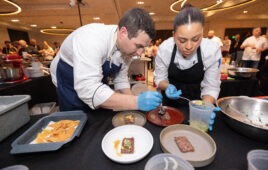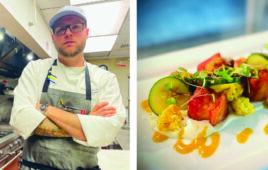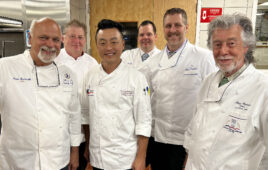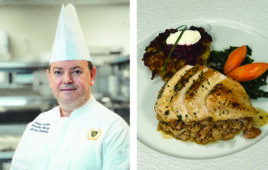Thriving in the wake of addiction has not been simple for this chef, who has requested to remain anonymous for this interview. After multiple stints in jail and a devastating loss, he began the process of recovery.
Since he began his sobriety, he has learned much about his will and what he needs to be successful. He has carefully and methodically climbed the ladder to become an executive club chef. And while he can never undo his past, he is laser-focused on his future.
For him, recovery is an ongoing process that requires constant upkeep. But it has made him thoughtful, stronger and more resilient than he ever dreamed he would become. As a result, he is about to give back to others through his craft while continuing to evolve and improve as a chef.
CRC: Tell us a little about your culinary background.
Chef: I began working in the culinary industry when I was 15. I worked at mom-and-pop restaurants cooking and waiting tables. I dropped out of high school by the time I was 16 and received my GED.
CRC: When did your addiction start?
Chef: It started right around when I dropped out. I started by just smoking weed with friends occasionally. It progressed to more frequent usage, though, and eventually to harder drugs. By 17 I was fully immersed in the culture of heroin and cocaine. At 18 I moved out of state for my first stint in rehab. Within weeks of coming out of rehab, I went right back to using and eventually was living with a couple of cocaine dealers.
During this time, I decided to steal a kilo of cocaine from them. I was caught by the police, taken to jail and sentenced to six years in the department of corrections. This is when I started to really immerse myself in the culinary arena. I would order books from Escoffier, The Professional Chef, and more. I studied those books inside and out during the time when I was incarcerated. Two years before I was to be released, I was able to complete an American Culinary Federation culinary skills program with a chef I still consider to be a great mentor today. That chef introduced me to a chef who ran a culinary school nearby so, upon my release, I started attending that school while also working in the industry.
But my addictions started to resurface. I never took sobriety seriously. I didn’t think I had a problem. I was back in jail numerous times over the next two years. It wasn’t until a close family member passed away that I finally decided to begin alcoholics anonymous and narcotics anonymous.
CRC: What was your life like in those days?
Chef: I worked and went to school, but any free time I had would be spent getting high or looking for ways to make more money either by stealing from stores or selling drugs. I was caught in a cycle that I didn’t understand how to break or even understand why it was happening. I was living to get high. It was a very sad part of my life.
CRC: What were some of the biggest impacts of your addiction on your life?
Chef: Addiction caused me to quit school and lose jobs, one after another. I remember a chef telling me at one point, “You have so much talent and could go so far in this industry, but I can’t trust if you will show up or not.”
My “professional life” didn’t exist. I worked with chefs who would try to help, but I would turn them away, thinking they were wrong and that they didn’t know anything. I had given up on ever being successful. I alienated everyone I was close with. My family wanted nothing to do with me.
CRC: When did you realize you needed to change and how did you begin?
Chef: I realized I needed help when I was basically homeless and sleeping on someone’s couch. I hadn’t worked in months. I would just steal and sell drugs to pay for things and support my addiction. Then I received a phone call that my grandmother had passed away. It broke my heart. I dropped to my knees, asking God, “Why me? Why do I have to go through all of this?”
At that moment I realized I was in control of my future. I had to seek help and take it one day at a time. I reached out to a family friend who owned a rehab facility. Even though I had been there before, I decided to go again, but this time I decided I would take it seriously.
CRC: What was treatment like for you?
Chef: Treatment is a big part of my story. I had been to numerous meetings and facilities but until I was ready to take it seriously, it never worked. On the day I reached out for help I was ready to surrender everything just to have a small chance at a “normal” life.
CRC: What are some of the most important lessons you learned as you began recovery?
Chef: I’ve learned that the steps in Alcoholics Anonymous are key to living a good life, regardless of whether you are an addict or not. They focus on taking it one day at a time, admitting you are powerless, and understanding your defaults of character. We work to make direct amends to those we’ve harmed, too. I harmed so many people through my addiction that it was a scary and daunting task to ask for forgiveness in a true way. But it was necessary.
CRC: You are now a successful executive club chef. Does your past ever complicate your current career?
Chef: On a daily basis, but mostly because of my own insecurities about never being good enough or living up to others’ expectations of me. I did, however, land a job even with a background that will stick with me forever. Even so, I will forever struggle with how to get people to look past my record and see the person I am today.
It has been extremely difficult to get to this point. And I feel like it is never enough so I must always do more to set myself apart. It’s a double-edged sword. I have an understanding of people I may not have if I had not gone through the things I went through. I believe my journey has ultimately made me be a better leader. Also, I never hide my past so it makes other cooks understand they can achieve great things if they are diligent.
CRC: What do you wish other chefs knew about addiction? What do you wish members knew about addiction?
Chef: I wish people understood what it takes to overcome addiction. It is far from easy. A person can know they are not living up to their potential, but be unable to change.
Also, just because you have a history of addiction, that doesn’t mean you can’t or won’t change. Addiction doesn’t make a person bad. It means they have demons they are battling—and a little understanding can go a long way.
CRC: How do you continue to maintain your health, fitness, and balance in life?
Chef: It’s a struggle being an executive chef as it requires long hours. Today I work to find a happy medium between work and home. As the years pass, it gets easier to understand what balance is. For me, balance sometimes looks like me making myself do things even when I am tired, like getting off work and stopping by a family function even though it’s only for an hour or just sitting alone in the car after work and reflecting on life.
CRC: Why do you think so many chefs struggle with addiction?
Chef: I think part of it has to do with the industry and lifestyle surrounding it. We work long, obscure hours and chefs have also built reputations with a work-hard-play-hard philosophy. When we leave work, the only things open are bars. Our industry is also transient with little work-life balance or job security. Many live from paycheck to paycheck. This adds to a sense of hopelessness and disparity which can often lead to addiction.
CRC: What advice would you give chefs who struggle with addiction?
Chef: Seek help. Find someone you can relate to and have a conversation with them about your addiction. Maybe that person is a recovering addict who is looking to help others on a path to recovery. Maybe it’s a mentor or a family member. Also, try to self-reflect on life and where you want to be. Only you can choose to change, but it helps when you surround yourself with positive people.




